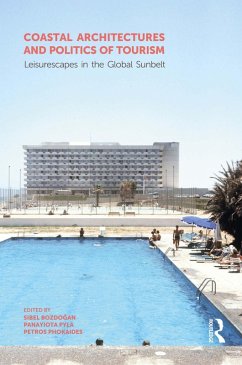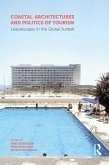The 21 chapters in this book analyze selected case studies of architectures and landscapes around the world, contextualizing them within economic geographies of national development, the geopolitics of the Cold War, the legacies of colonialism, and the international dynamics of decolonization.
Dieser Download kann aus rechtlichen Gründen nur mit Rechnungsadresse in A, B, BG, CY, CZ, D, DK, EW, E, FIN, F, GR, HR, H, IRL, I, LT, L, LR, M, NL, PL, P, R, S, SLO, SK ausgeliefert werden.
"This book is an outstanding collaboration with unforeseen innovations. On the one hand, it is a unique global history of the Cold-War that follows the path of the sun-belt from the Caribbean to Mediterranean, Black Sea and Indian Ocean. On the other hand, it demonstrates the architecture of tourism in all its complexity. Reading the essays together, we understand how building hotels and going on vacation could be a political act against austerity impositions or an infrastructure to lure investors; a rebellion against former colonizers or a settler colonial violence that dispossessed indigenous habitants; a force that globalized western bourgeois standards or an impetus for an identifiable local aesthetic; a cultural tranquilizer or a declaration of the right to rest; a competition with oil industry or a policy to occupy countries with oil-dependent highway networks."
Esra Akcan, Author of Architecture in Translation; Turkey: Modern Architectures in History (with S. Bozdogan); Open Architecture and Abolish Human Bans.
"Sun, sea and sand, the token features of leisurely holidays, represent much more than just the bounty of nature. The sunbelt came into being as a result of geopolitical forces, architectural formations and socio-economic evolutions, which produced not only beach resorts but also political tensions, racial hierarchies and environmental degradation. Built on detailed case studies, this volume offers a thorough analysis of the phenomenon."
Hilde Heynen, University of Leuven, Belgium
"A highly innovative book that expands our understanding of the role played by modern architecture in shaping the contours of the post WWII geopolitical arena. This collection is a a must read for anyone interested in not only the global history of modernism, but also how its scale and materiality allowed for new ways of imagining and managing power, modes which are still very much in play in the emerging politics of global climate change and pandemics."
Ijlal Muzaffar, Associate Professor of Modern Architecture, Rhode Island School of Design
Esra Akcan, Author of Architecture in Translation; Turkey: Modern Architectures in History (with S. Bozdogan); Open Architecture and Abolish Human Bans.
"Sun, sea and sand, the token features of leisurely holidays, represent much more than just the bounty of nature. The sunbelt came into being as a result of geopolitical forces, architectural formations and socio-economic evolutions, which produced not only beach resorts but also political tensions, racial hierarchies and environmental degradation. Built on detailed case studies, this volume offers a thorough analysis of the phenomenon."
Hilde Heynen, University of Leuven, Belgium
"A highly innovative book that expands our understanding of the role played by modern architecture in shaping the contours of the post WWII geopolitical arena. This collection is a a must read for anyone interested in not only the global history of modernism, but also how its scale and materiality allowed for new ways of imagining and managing power, modes which are still very much in play in the emerging politics of global climate change and pandemics."
Ijlal Muzaffar, Associate Professor of Modern Architecture, Rhode Island School of Design









